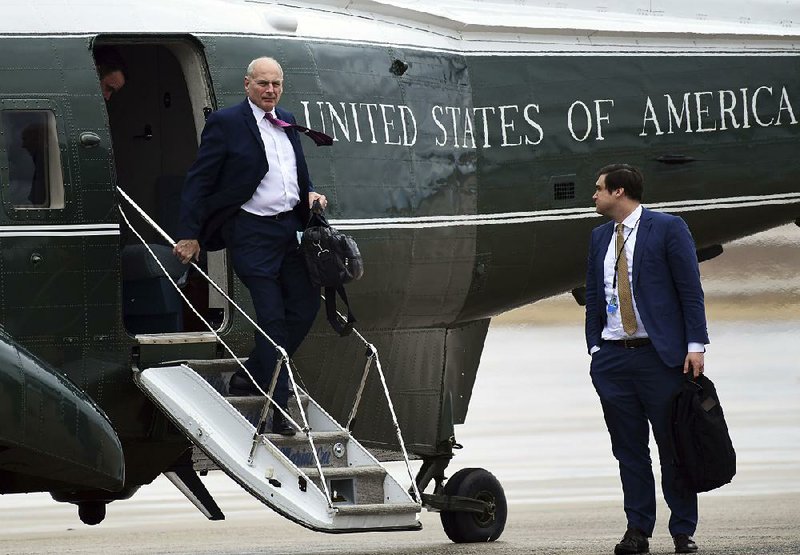WASHINGTON -- White House Chief of Staff John Kelly, under pressure over his handling of allegations of domestic abuse against a top aide, has approved an overhaul of how the White House manages security-clearance investigations, acknowledging missteps but putting the onus on the FBI and the Justice Department to now hand-deliver updates and provide more information.
The five pages of proposed changes, signed by Kelly on Friday, were obtained by The Washington Post.
Kelly worked closely with White House Counsel Don McGahn in discussing and outlining the changes, according to officials, who were not authorized to speak publicly. McGahn also has been criticized for his response to former White House aide Rob Porter's clearance. Porter, who resigned last week, remained as staff secretary, with access to highly classified material, months after the claims of emotional and physical abuse by his two ex-wives were reported to the FBI.
Kelly begins the memo by stating that in the wake of the Porter scandal, "We should -- and in the future, must -- do better" and acknowledges that problems in the security-clearance process demanded attention.
Later, Kelly writes, "But recent events have exposed some remaining shortcomings," beyond the changes Kelly implemented since taking over as chief of staff last year. "Now is the time to take a hard look at the way the White House processes clearance requests."
The document, titled "Improvements to the clearance process," is addressed to McGahn and national security adviser H.R. McMaster. Attorney General Jeff Sessions, Director of National Intelligence Dan Coats and FBI Director Christopher Wray are copied.
The memo says the FBI and Justice Department have offered their cooperation with Kelly's requests in recent days, and that "going forward, all [background investigations] of potential Commissioned Officers should be flagged for the FBI at the outset and then hand-delivered to the White House Counsel personally upon completion. The FBI official who delivers these files should verbally brief the White House Counsel on any information in those files they deem to be significantly derogatory."
The time frame laid out in the memo between derogatory information being found in a background check and it being reported to the White House is 48 hours. But Kelly writes he is still not sure whether this is achievable.
President Donald Trump's administration has said Porter's security-clearance investigation remained open because the White House Personnel Security Office, which approves clearances, had not finished its work. Administration officials also have suggested that results of that investigation were closely held within the office.
But people who worked on both sides of such investigations in past administrations said in interviews this week that the White House's portrayal of the role played by the security office is inconsistent with how it previously operated. For instance, they said that if the security office became aware of something in an aide's background check that could jeopardize the person's security clearance, it would likely inform the White House counsel's office.
Kelly puts an emphasis in the memo on how it's not the White House's sole responsibility to adapt and move faster to learn about the FBI's conclusions on background investigations, despite Wray's statement.
He says the White House will now require "estimated return dates to create benchmarks and set expectations on timing," although he does not cite details for how that would work.
Kelly, who prizes his reputation for order, veers throughout the document from talking up his efforts to bring order to the White House while also stating that changes must be implemented, reflecting his desire inside the White House to stay on as Trump's top aide rather than step away after Porter's resignation.
The chief of staff states that a "number of reforms have already been implemented," but does not offer a timeline of when some of these changes have been made, such as requiring all security clearances to be approved by his office and having the Personnel Security Office make a "suitability determination before being on-boarded and granted access to the White House complex."
A Section on 02/17/2018
